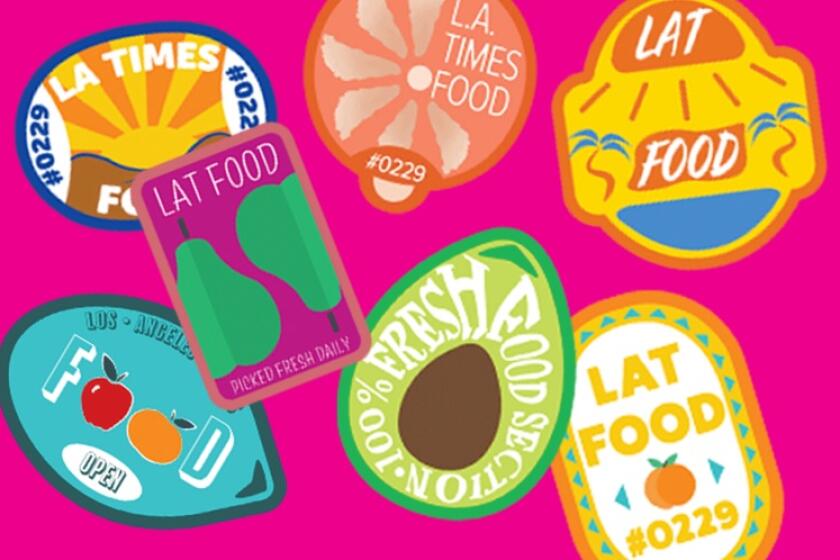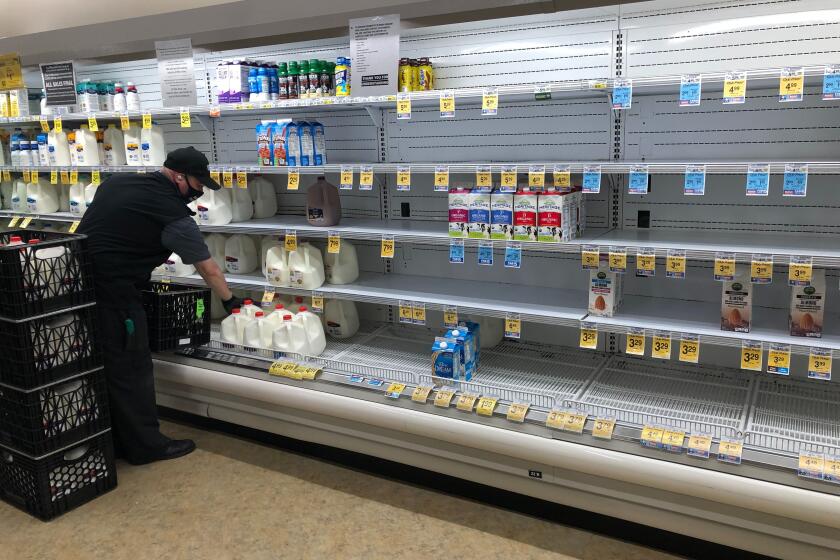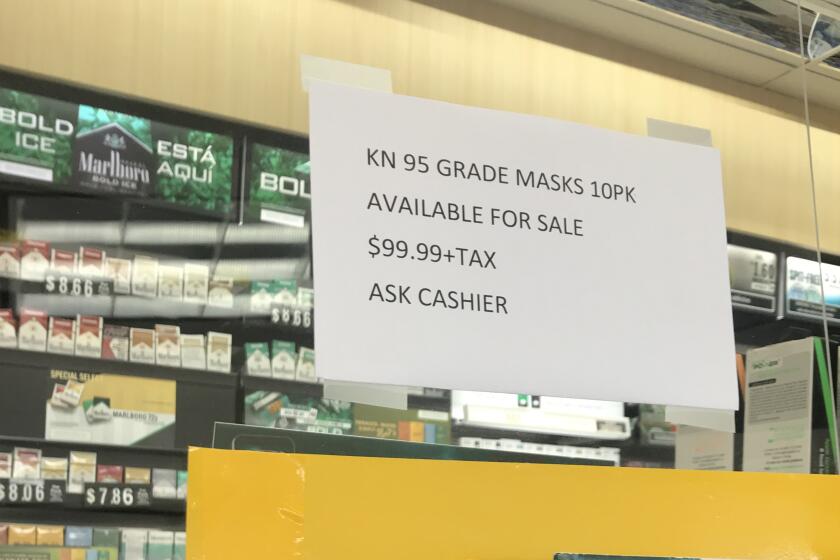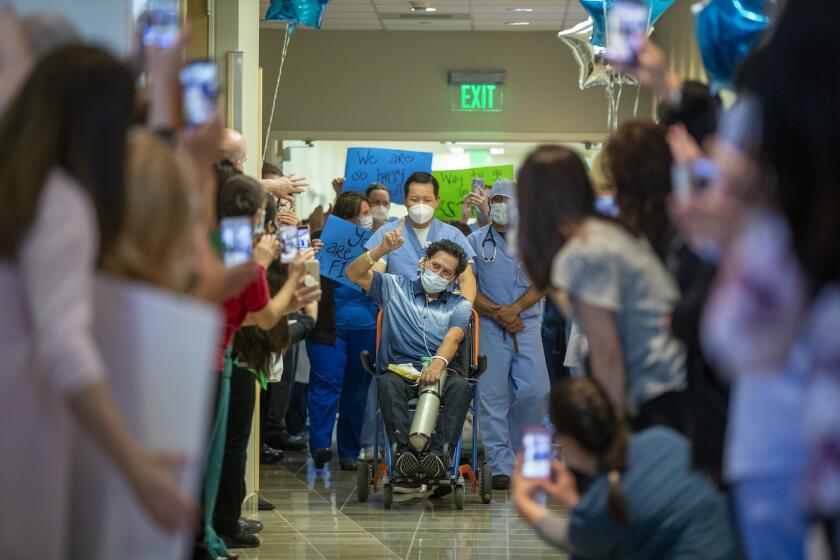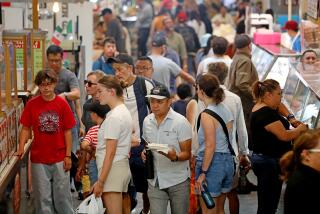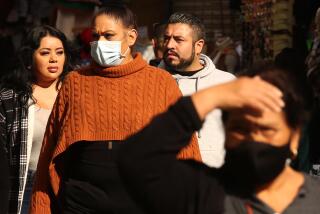L.A.’s coronavirus mask order is now the law. 5 things you need to know
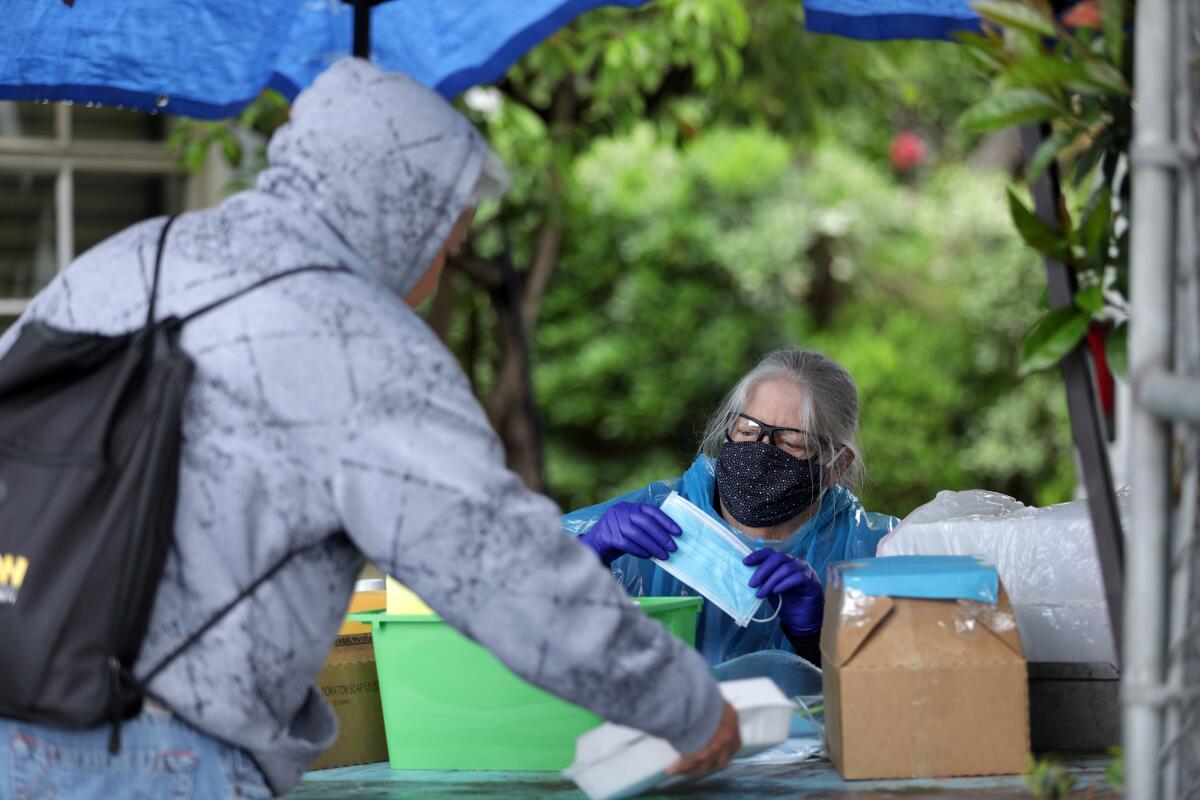
- Share via
If you are going to a grocery store, pharmacy or doing other essential shopping in Los Angeles, you need to be wearing a mask or face covering.
Beginning Friday, a new city order requires both shoppers and workers to wear a face covering.
It’s the latest effort by the city to slow the spread of the novel coronavirus. The stay-at-home order has already closed nonessential businesses as well as many beaches, trails and recreation centers.
Here are five things to bear in mind:
1. The idea is to protect both customers and workers
California has been under stay-at-home orders for several weeks, and that limits trips to essential business like food shopping, doctor’s appointments and pharmacy trips.
To maintain coronavirus social distancing guidelines and to calm anxiety about going out to grocery stores, here are safety tips to make supermarket shopping faster.
There has been concern about the potential exposure to coronavirus at retailers such as supermarkets. Many markets have limited how many people can enter and tried to impose social distancing measures in lines. But staying 6 feet apart is difficult at times.
Under the order, workers at most essential businesses must wear face coverings, which business owners must either provide or reimburse workers for buying.
If a business refuses to provide face coverings for its workers, it could be fined, but the hope is that businesses and customers will follow the order without issue.
Not complying is a misdemeanor. But Mayor Eric Garcetti said earlier this week he hopes people will voluntarily follow the order. “Our idea is not to be arresting and fining people for the face coverings,” Garcetti said. “This is about self-enforcement mostly.”
2. It’s not just at the supermarket and drug stores
Most people will be impacted at big retailers: grocery stores, big box centers, drug stores, hardware stores and pharmacies.
But the employee order covers many other walks of life. Many facets of the social services system are covered, including such areas as domestic counseling, gang intervention and homeless services.
The demand for grocery store delivery has never been greater. But is it fair to workers?
“Organizations and businesses that provide food, social services and other necessities of life for economically disadvantaged or otherwise needy individuals” are under the face-covering order.
Many parts of the “gig economy” are also covered, including ride sharing and food and grocery delivery.
Other professions also must comply: hotel and laundry workers, plumbers, electricians, exterminators, custodial/janitorial workers, handyman services, funeral home workers, moving services, HVAC installers, carpenters, day laborers, landscapers and gardeners, and property managers.
3. Other jurisdictions have these rules, and some go further
Riverside and San Bernardino counties also have mandatory face-covering rules.
Orange County on Thursday issued a recommendation “strongly encouraging” employees at businesses open during the pandemic to wear face coverings while at work.
Beverly Hills has gone even further. The city said people must wear face coverings when they leave their homes, including for walks through the neighborhood.
Under the order, drivers traveling alone or with members of their households do not need to wear face coverings unless they lower their vehicle’s windows for any reason, including to interact with first responders, food service workers or others who are not members of their household.
4. There is one thing officials don’t want you to do
The Los Angeles order does not require that customers’ or workers’ face coverings be medical grade or N95 masks. Local and state leaders continue to plead with the public to refrain from buying those masks to ensure medical and emergency workers have enough protective gear to safely perform their jobs.
A gas station in San Diego County was selling KN95 masks at a price five times higher than what online retailers were advertising.
“All essential, nonmedical workers required to wear these face coverings must frequently (at least once a day) wash any reusable face coverings, for the health and safety of themselves and others,” the L.A. order reads. “Single-use face coverings must be properly discarded into trash receptacles.”
Additionally, mask wearing is not a substitute for other key coronavirus guidance, such as hand washing and social distancing.
5. Here’s what you need to know about masks and face coverings
Basics: The material should cover both the nose and mouth. Be sure your mask is comfortable; you don’t want to have to keep adjusting the mask because that means touching your face.
How to make: It’s not that hard. The Times has a guide here as well as video.
How to keep clean: California health officials recommend frequently washing cloth face masks — ideally after each use, or at least daily. Place the coverings in a bag or bin until they can be washed with detergent and hot water and dried on a hot cycle (or at least washed with hot, soapy water). If you have to wear the covering again before washing it, wash your hands immediately after putting it back on and avoid touching your face. And throw out any masks that no longer cover your nose and mouth, have stretched out or damaged straps, can’t stay on your face or have holes or tears in the fabric.
These are some of the unusual new scenes across the Southland during the coronavirus outbreak.
More to Read
Sign up for Essential California
The most important California stories and recommendations in your inbox every morning.
You may occasionally receive promotional content from the Los Angeles Times.
